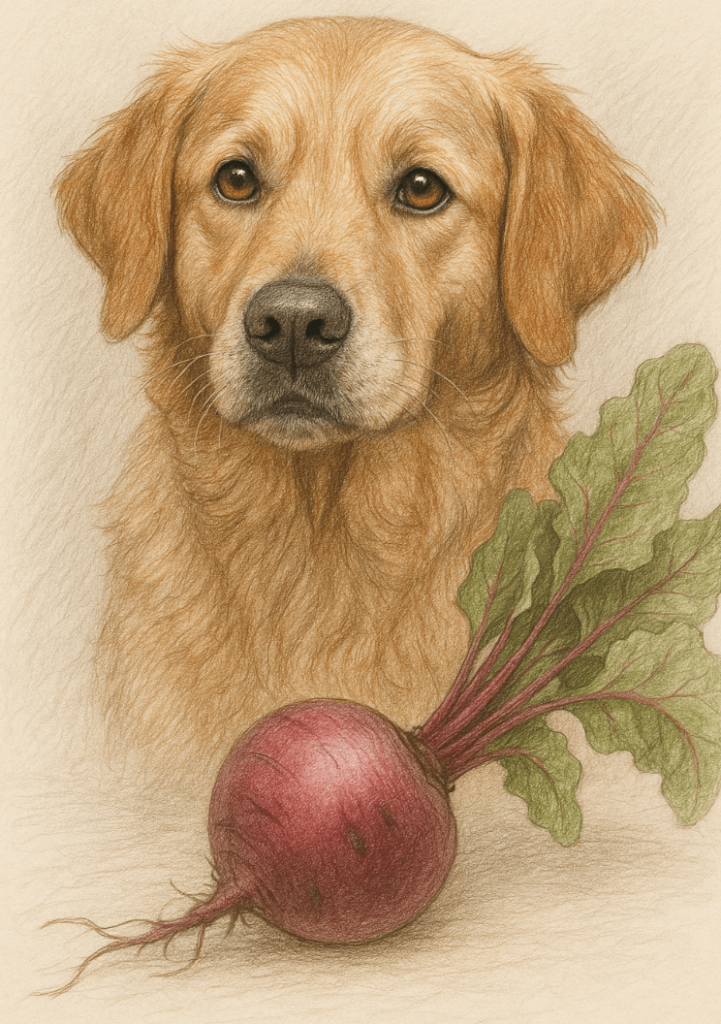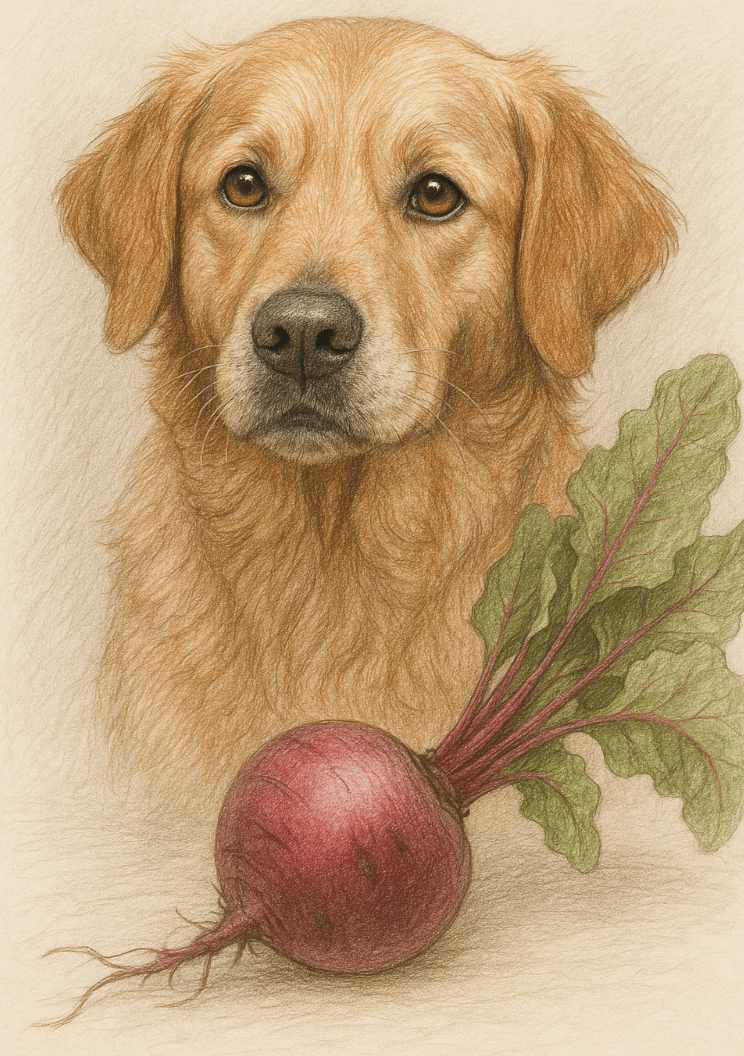Can Dogs Eat Beets?
As a responsible pet owner, you may often wonder which human foods are safe and healthy for your furry friend. Beets, with their vibrant color and nutritional benefits, might catch your attention as a potential snack for your dog. But can dogs eat beets? The short answer is yes—beets are generally safe for dogs in moderation. However, there are important considerations to keep in mind before adding this root vegetable to your dog’s diet. In this blog post, we’ll explore the benefits, risks, and best practices for feeding beets to your canine companion, ensuring their health and happiness remain a top priority.
Health Benefits of Feeding Beets to Dogs
Beets are packed with nutrients that can offer several health benefits for your dog when fed in moderation. Here’s how this colorful vegetable can support your pup’s well-being.
Rich in Fiber:
The high fiber content in beets supports healthy digestion and can help regulate bowel movements.Packed with Vitamins:
Beets contain essential vitamins like Vitamin C and folate, which boost the immune system and promote overall health.Antioxidant Properties:
Antioxidants in beets help combat free radicals, reducing inflammation and supporting long-term wellness.Supports Heart Health:
The nitrates in beets can improve blood circulation, benefiting your dog’s cardiovascular system.Low in Calories:
Beets are a low-calorie treat option, making them a great choice for weight management.
While these benefits make beets a nutritious addition, it’s important to feed them in moderation to avoid potential side effects.
Potential Risks of Feeding Beets to Dogs
Though beets are safe for most dogs, they come with some risks if not prepared or portioned correctly. Understanding these concerns will help you make informed decisions about including beets in your dog’s diet.
Digestive Upset:
Too many beets can cause gas, bloating, or diarrhea due to their high fiber content.Oxalates and Kidney Stones:
Beets contain oxalates, which may contribute to kidney stone formation in dogs prone to urinary issues.Sugar Content:
Beets have natural sugars that can spike blood sugar levels, making them unsuitable for diabetic dogs.Choking Hazard:
Large chunks of raw beet can pose a choking risk, especially for small breeds or dogs that gulp food quickly.Allergic Reactions:
While rare, some dogs may experience allergic reactions such as itching or gastrointestinal distress after eating beets.
Being mindful of these risks ensures your dog enjoys the benefits of beets without compromising their health.
Check this guide 👉Can Dogs Eat Walnuts? Best 7 Expert Tips!
Check this guide 👉Can Dogs Eat Peanuts? Best 7 Expert Tips!
Check this guide 👉Can Dogs Eat Blackberries? Best 7 Expert Tips!

Benefits of Feeding Beets to Dogs | Risks of Feeding Beets to Dogs |
|---|---|
High in fiber for better digestion | Can cause digestive upset in large amounts |
Rich in antioxidants and vitamins | Contains oxalates that may harm kidneys |
Supports heart health with nitrates | High sugar content unsuitable for diabetics |
Low-calorie treat for weight control | Choking hazard from large or raw pieces |
Boosts immune system function | Rare allergic reactions possible |
How to Safely Feed Beets to Your Dog
If you decide to introduce beets to your dog’s diet, preparation and portion control are key to ensuring their safety and enjoyment. Follow these tips for a smooth experience.
Cook the Beets First:
Raw beets can be tough and difficult to digest; steaming or boiling them softens the texture without added fats or seasonings.Avoid Seasonings:
Never add salt, sugar, or spices, as these can upset your dog’s stomach or pose health risks.Cut Into Small Pieces:
Dice cooked beets into bite-sized pieces to prevent choking and make them easier to chew.Serve in Moderation:
Limit beet portions to a teaspoon or two per serving, depending on your dog’s size and dietary needs.Monitor for Reactions:
Watch for signs of digestive upset or allergies after introducing beets, and consult your vet if issues arise.
By following these guidelines, you can safely incorporate beets into your dog’s diet as an occasional treat.
Alternative Vegetables for Dogs
If beets aren’t suitable for your dog or you’re looking for other nutritious options, there are plenty of dog-friendly vegetables to consider. These alternatives provide similar benefits without the associated risks.
Carrots:
Crunchy and low in calories, carrots are excellent for dental health and packed with beta-carotene.Green Beans:
A low-calorie, fiber-rich snack that’s easy to digest and perfect for weight management.Sweet Potatoes:
High in vitamins and fiber, sweet potatoes support digestion and boost immunity when cooked plain.Pumpkin:
Canned or fresh pumpkin aids digestion and is particularly helpful for dogs with upset stomachs.Zucchini:
This hydrating vegetable is low in calories and rich in vitamins, making it a light yet nutritious treat.
These alternatives ensure your dog gets the nutrients they need while avoiding potential pitfalls.
Signs Your Dog May Not Tolerate Beets
Not all dogs react well to beets, and recognizing signs of intolerance is crucial for their well-being. Here are some indicators that beets may not agree with your dog.
Diarrhea or Vomiting:
Loose stools or vomiting can signal digestive distress caused by beet consumption.Excessive Gas:
Increased flatulence may indicate difficulty digesting the high fiber content in beets.Lethargy or Discomfort:
Unusual tiredness or restlessness could suggest an adverse reaction to the vegetable.Itching or Skin Irritation:
Allergic reactions may manifest as itching, redness, or hives on your dog’s skin.Loss of Appetite:
Refusal to eat or lack of interest in food could indicate discomfort or illness.
If you notice any of these signs, discontinue feeding beets and consult your veterinarian promptly.
Creative Ways to Serve Beets to Your Dog
If your dog enjoys beets, there are fun and creative ways to incorporate them into their meals or snacks. These ideas make feeding time more exciting while keeping nutrition in mind.
Mix with Kibble:
Chop cooked beets into tiny pieces and mix them with your dog’s regular kibble for added flavor and nutrients.Blend into Treats:
Puree cooked beets and use them as an ingredient in homemade dog treats like biscuits or frozen popsicles.Top with Pumpkin:
Combine mashed beets with plain pumpkin puree for a nutrient-packed topping that aids digestion.Freeze for Fun:
Freeze small beet cubes in water or broth to create refreshing summer treats.Stuff into Toys:
Use beet puree to stuff interactive toys like Kong, providing both entertainment and nourishment.
These creative approaches make beet consumption enjoyable for your pup.
Tips for Introducing New Foods to Your Dog’s Diet
Introducing new foods like beets requires patience and observation to ensure your dog adapts well. These tips will help you transition smoothly and minimize potential issues.
Start Small:
Begin with tiny amounts to gauge your dog’s reaction before increasing portion sizes.Observe Behavior:
Watch for changes in energy levels, appetite, or stool consistency after introducing new foods.Keep a Food Diary:
Track what you feed your dog and note any positive or negative reactions for future reference.Consult Your Vet:
Always seek professional advice before making significant changes to your dog’s diet.Avoid Sudden Changes:
Gradually introduce new foods over several days to prevent digestive upset.
By following these tips, you can safely expand your dog’s palate while prioritizing their health and well-being.
Frequently Asked Questions About Feeding Beets to Dogs
Are cooked beets safe for dogs?
Yes, cooked beets are safe as long as they’re plain and served in moderation.
Can puppies eat beets?
Puppies can eat small amounts of cooked beets, but consult your vet before introducing new foods.
How much beet can I give my dog?
Start with a teaspoon or two, adjusting based on your dog’s size and tolerance.
What should I do if my dog eats raw beets?
Monitor for signs of digestive upset; contact your vet if symptoms persist.
Are pickled or canned beets safe for dogs?
No, pickled or canned beets often contain harmful additives like salt and preservatives.
Incorporating Beets into Your Dog’s Diet Responsibly
Feeding beets to your dog can be a healthy and enjoyable way to diversify their diet, provided you do so responsibly. By understanding the benefits, risks, and proper preparation methods, you can ensure your pup reaps the rewards without facing adverse effects. Always prioritize moderation and consult your veterinarian if you’re unsure about introducing new foods. With careful planning, beets can become a tasty and nutritious addition to your dog’s menu, contributing to their overall health and happiness.
Cat Anaphylactic Shock Treatment Costs: Best 7 Expert Tips! – Learn about costs, treatments, and financial aid options to save your cat’s life.
Exocrine Pancreatic Insufficiency in Cats: Best 7 Tips! – Learn to spot symptoms, manage EPI effectively, and improve your cat’s quality of life with expert advice.
Cost of Dog Anaphylactic Shock Treatment: Best 7 Tips! – Learn about emergency costs, financial planning, and ways to manage expenses for your dog’s care.
Exocrine Pancreatic Insufficiency in Dogs: Best 7 Tips! – Learn to spot symptoms, manage EPI effectively, and improve your dog’s quality of life with expert guidance.





